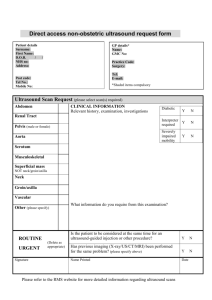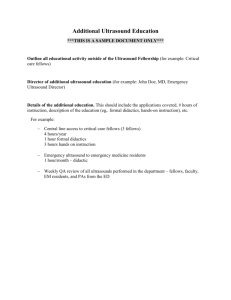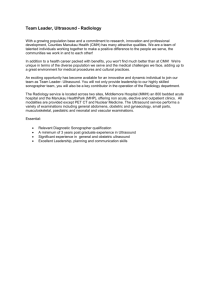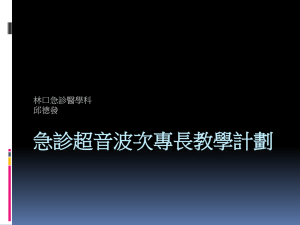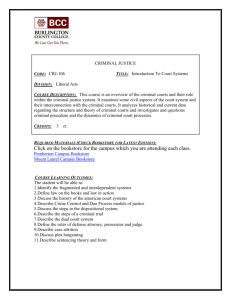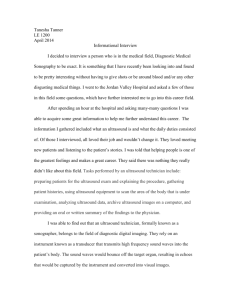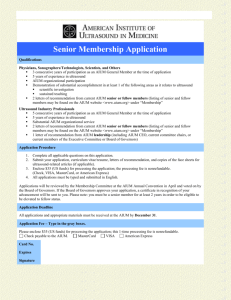DMS 211 Ultrasound Physics II - Rowan College at Burlington County
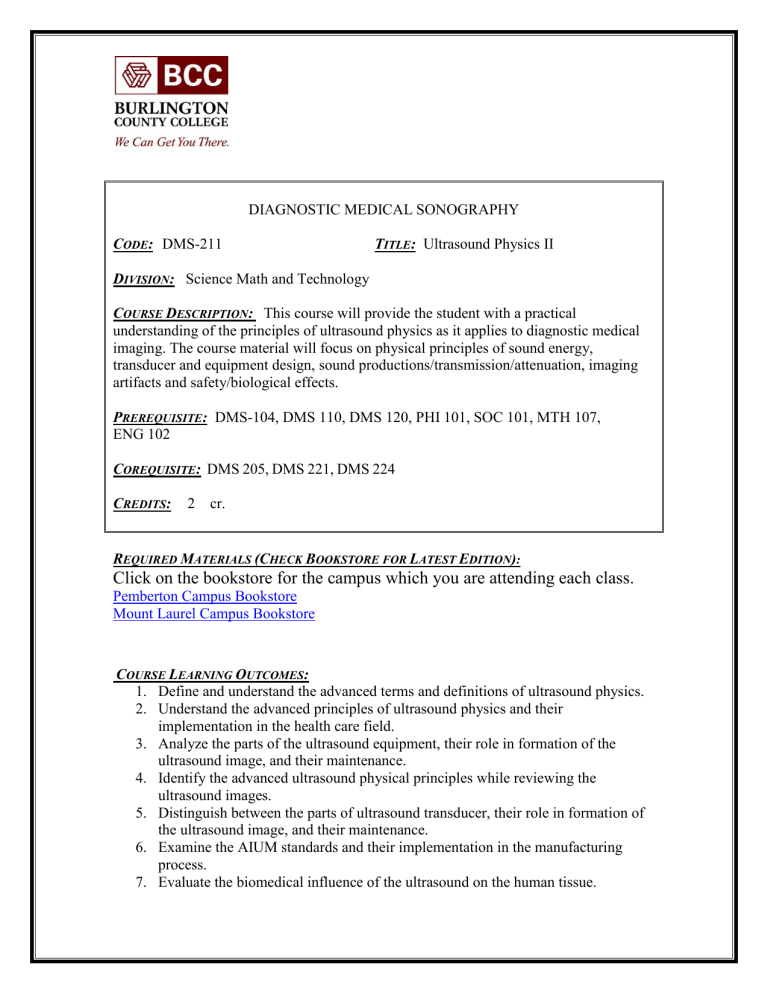
DIAGNOSTIC MEDICAL SONOGRAPHY
C ODE : DMS-211 T ITLE : Ultrasound Physics II
D
IVISION
: Science Math and Technology
C
OURSE
D
ESCRIPTION
: This course will provide the student with a practical understanding of the principles of ultrasound physics as it applies to diagnostic medical imaging. The course material will focus on physical principles of sound energy, transducer and equipment design, sound productions/transmission/attenuation, imaging artifacts and safety/biological effects.
P REREQUISITE : DMS-104, DMS 110, DMS 120, PHI 101, SOC 101, MTH 107,
ENG 102
C OREQUISITE : DMS 205, DMS 221, DMS 224
C
REDITS
: 2 cr.
R
EQUIRED
M
ATERIALS
(C
HECK
B
OOKSTORE FOR
L
ATEST
E
DITION
) :
Click on the bookstore for the campus which you are attending each class.
Pemberton Campus Bookstore
Mount Laurel Campus Bookstore
C
OURSE
L
EARNING
O
UTCOMES
:
1.
Define and understand the advanced terms and definitions of ultrasound physics.
2.
Understand the advanced principles of ultrasound physics and their implementation in the health care field.
3.
Analyze the parts of the ultrasound equipment, their role in formation of the ultrasound image, and their maintenance.
4.
Identify the advanced ultrasound physical principles while reviewing the ultrasound images.
5.
Distinguish between the parts of ultrasound transducer, their role in formation of the ultrasound image, and their maintenance.
6.
Examine the AIUM standards and their implementation in the manufacturing process.
7.
Evaluate the biomedical influence of the ultrasound on the human tissue.
G
ENERAL
E
DUCATION
O
UTCOMES IN
T
HIS
C
OURSE
:
Written and Oral Communication:
Communication
* Students will logically and persuasively support their points of view or findings.
* Students will communicate meaningfully with a chosen audience while demonstrating critical thought.
Quantitative Knowledge and Skills:
Mathematics
* Students will translate quantifiable problems into mathematical terms and solve these problems using mathematical or statistical operations.
Scientific Knowledge and Reasoning: * Students will understand and employ the scientific method
Science of inquiry to draw conclusions based on verifiable evidence.
Society and Human Behavior: Social
Science
* Students will demonstrate a general knowledge of political, social and economic concepts and systems and their effects on society.
Technological Competency or
Information Literacy: Technology
* Students will use critical thinking skills for computerbased access, analysis, and presentation of information.
Humanistic Perspective: Humanities
PHILOSOPHY:
* Students will demonstrate an understanding of fundamental philosophical questions and the contributions of major philosophers to resolve them.
Historical Perspective: History * Students will demonstrate knowledge of the nature, origins, central events and significant institutions of major civilizations
Global and Cultural Awareness:
Diversity
Ethical Reasoning and Action
* Students will be able to explain how communication and culture are interrelated.
* Students will take a position on an ethical issue or a situation and defend it.
T
OPICAL
O
UTLINE FOR THE
C
OURSE
:
Session 1: Review of Ultrasound Physics I
Session 2: Ultrasound equipment I
Session 3: Physical applications in ultrasound
Session 4: Resolution
Session 5: Binary system and digital storage
Session 6: Midterm Exam
Session 7: Bioeffects and Safety (Sonographers)
Session 8: Bioeffects and Safety (Patients)
Session 9: Phantoms
Session 10: AIUM
Session 11: Review
Session 12: Final Exam
C OURSE A CTIVITIES :
Course activities vary from course to course and instructor to instructor. Below is a listing of some of the activities students can anticipate in this course:
Writing assignments: students will analyze current issues in the field using current articles from the popular press as well as library research including electronic resources databases.
Speaking assignments: students will present research individually or in groups using current technology to support the presentation (e.g., PowerPoint presentation); students will participate in discussions and debates related to the topics in the lessons. Discussions may also focus on cross-cultural and legalethical dilemmas as they relate to the course content.
Simulation activities: Trends and issues will analyzed for their ethical as well as social or legal significance. Students might role-play common situations for classmates to analyze. Current news articles may be used to generate discussion.
Case Studies: Complex situations and scenarios will be analyzed in cooperative group settings or as homework assignments.
Lectures: This format will include question and answer sessions to provide interactivity between students and instructor.
Speakers: Representatives from various related fields may be invited to speak.
Videos: Related topics will provide impetus for discussion.
E DUCATIONAL T ECHNOLOGY :
Burlington County College advocates a technology enhanced teaching and learning environment. Advanced technological tools may be used in any course section to facilitate instruction. Many of our sections are web-enhanced, which means that some of your work will be submitted or completed online. Web enhancements may include online materials, grade books, testing and quizzes and assignment submission. Many students enjoy the flexibility and convenience that these online enhancements have provided, however if you have concerns about the technology involved, please speak to your instructor immediately.
S
TUDENT
E
VALUATIONS
:
The student will be evaluated on the degree to which student learning outcomes are achieved. A variety of methods may be used such as tests, quizzes, class participation, projects, homework assignments, presentations, etc.
See individual instructor’s course handouts for grading system and criteria (point value for each assessment component in course, e.g. tests, papers, presentations, attendance etc.), number of papers and examinations required in the course, and testing policy including make ups and/or retests.
G
RADING
S
TANDARD
:
A Mastery of essential elements and related concepts, plus demonstrated excellence or originality.
B+ Mastery of essential elements and related concepts, showing higher level
C
D
F
B understanding.
Mastery of essential elements and related concepts.
C+ Above average knowledge of essential elements and related concepts.
Acceptable knowledge of essential elements and related concepts.
Minimal knowledge of related concepts.
Unsatisfactory progress. This grade may also be assigned in cases of academic misconduct, such as cheating or plagiarism, and/or excessive absences.
For other grades, see the current BCC catalog.
C
OLLEGE
P
OLICIES
:
The current college catalog and student handbook are important documents for understanding your rights and responsibilities as a student in the BCC classroom. Please read your catalog and handbook as they supplement this syllabus, particularly for information regarding:
Academic Integrity Code
Student Conduct Code
Student Grade Appeal Process
N OTIFICATION :
Burlington County College offers reasonable accommodations and/or services to persons with disabilities. The Special Populations Department offers comprehensive services to all students with any form of disability which hinders their academic success as long as the student provides appropriate documentation. Contact Special Populations at
Extension 1208 at (609) 894-9311 or visit the website at: http://www.bcc.edu/pages/209.asp
A
DDITIONAL
S
UPPORT
/L
ABS
:
BCC provides academic advising, student support personal counseling, transfer advising, and special accommodations for individuals with disabilities free to all students through the Division of Student Services. For more information about any of these services, visit the Parker Center on the Pemberton Campus or Laurel Hall on the Mt. Laurel Campus, or call (609) 894-9311 or (856) 222-9311, then dial the desired extension:
- Ext. 1557 Academic Advisement and Counseling
- Ext. 1803 Special Populations
- Ext. 2737 Transfer Center
Or visit the following websites:
Academic Advising
E-Advising http://www.bcc.edu/pages/206.asp
http://www.bcc.edu/pages/219.asp
Student Support Counseling http://www.bcc.edu/pages/274.asp?subdisp=1&subpar=206
Transfer Center http://www.bcc.edu/pages/185.asp
BCC offers a free tutoring for all currently enrolled students. For more information regarding The Tutoring Center call Extension 1495 at (609) 894-9311 or (856) 222-9311 or visit the Tutoring Center Website at http://staff.bcc.edu/tutoring/
Annual Review 2011-2012
DS
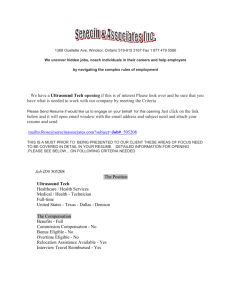
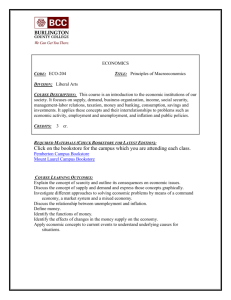
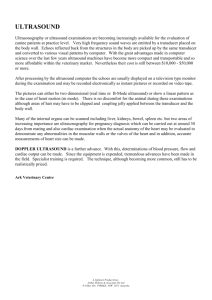
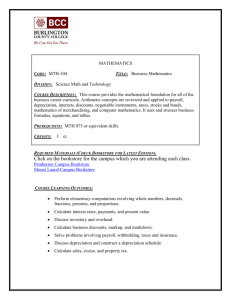
![Jiye Jin-2014[1].3.17](http://s2.studylib.net/store/data/005485437_1-38483f116d2f44a767f9ba4fa894c894-300x300.png)
